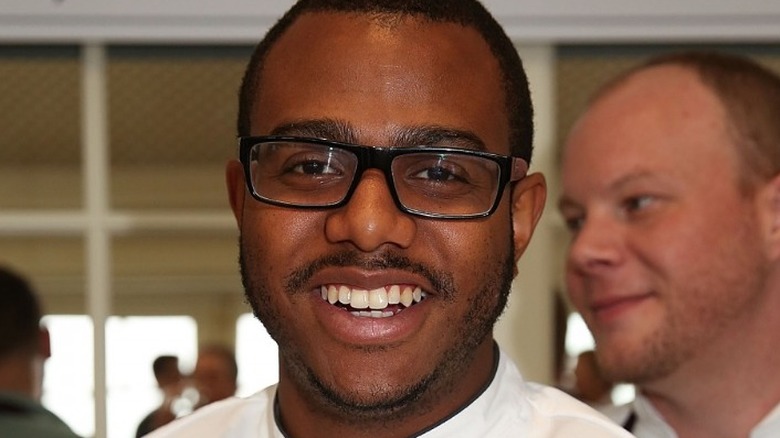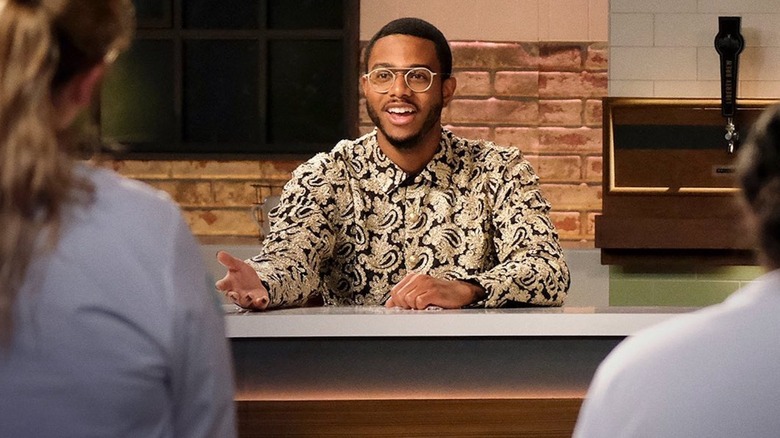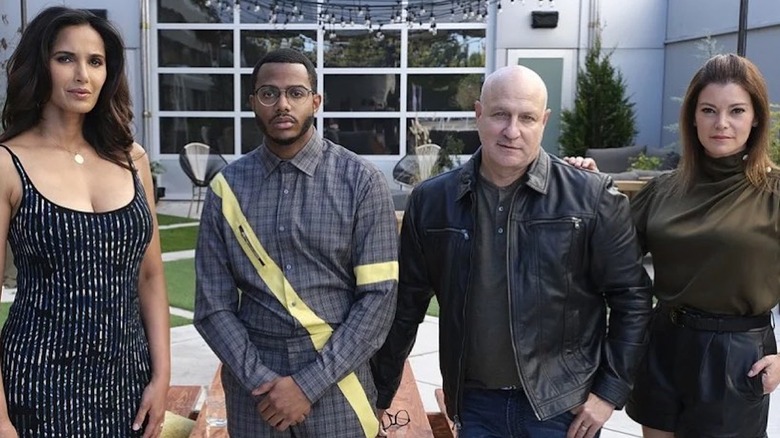Chef Kwame Onwuachi Reveals The Hardest Thing About Being On Top Chef - Exclusive
If the first time Kwame Onwuachi graced your screen was on that recent episode of "Top Chef" when he was sipping vino at an Oregon winery — as the ambitious Season 18 contestants frantically assembled food pairings for him to judge (per Wine Spectator) — perhaps you thought to yourself: "Wow, this guy has got it made!" What longtime "Top Chef" fans know, however, is that just five seasons ago, Onwuachi was right there in the kitchen himself, competing in Season 13. It was no cakewalk, the James Beard Award-winning chef freely attests.
In an exclusive interview with Mashed, Onwuachi shared the details on why competing on "Top Chef" is so grueling. "Oh man. It was scary," Onwuachi said. "I'll tell you that much. It was so nerve-racking. It's a lot harder than it looks. With however hard you think it is, add times 10 to that, and that's what it's like." What makes it so difficult? Let Onwuachi count the ways. "Not knowing what you're doing — the unknown," is the most stressful part, but it doesn't end there. "Add time constraints on top of that, and it makes it very challenging," he explained.
Why 'Top Chef' made Kwame Onwuachi a better chef
As difficult as it is to compete on "Top Chef," all that hard work pays off, according to Onwuachi. "You get to learn a lot, right? You get to cook for really amazing people time and time again," he pointed out. "And you have to get direct feedback on your cuisine that you're not able to get even at your restaurant." If you were a chef at a café, for example, "no one's coming up to you and telling you that you're missing a little bit of acid there. They're normally like, 'oh, everything was great. Thank you for the meal.'" In contrast, "Top Chef" pulls no punches. Onwuachi pointed out, "I was given feedback on my cuisine. Learning how to season things to the point where it can beat out 10 other dishes. And that is very valuable information that I don't take for granted."
It's because of these detailed critiques that so many contestants have evolved into culinary heavyweights. "They produced some of the best chefs in the world," Onwuachi said. "And you've seen the pedigree of people coming out of that, going on to do amazing things. It's not because of the publicity. It's because of what happens to those kitchens, what happens in that competition."
The difference between being a 'Top Chef' contestant vs. a judge
If it looks like it's easier to be a "Top Chef" judge compared to being a contestant — that's because, well, it is! "It was great. It was way better than running around trying to make a taco in 15 minutes," Onwuachi admitted.
All of his previous toils as a contestant made Onwuachi a better judge. "I think for someone like myself, I was able to judge from a point of empathy. I've been in their shoes," he explained. "So, it wasn't coming from a place of not knowing exactly what it's like to be in these challenges — to have these times of stress, [to] being thrust into this new environment and ... having a bunch of cameras in your face while you're trying to cook something."
Beyond that, Onwuachi's pedigree as a New York-born, Nigerian-raised chef offered the "Top Chef" contestants a unique perspective. "[I bring] a different palate," he said. "I have a different concentration of knowledge than what Tom [Colicchio] does or Padma [Lakshmi] or Gail [Simmons]. So I was able to bring something new and just a different lens than what has been portrayed before."
Be on the lookout for the Belvedere Vodka Organic Infusions line. And if you haven't already, be sure to add Kwame Onwuachi's memoir, "Notes from a Young Black Chef," to your summer reading list.


